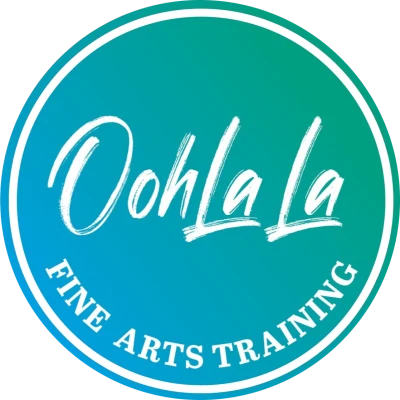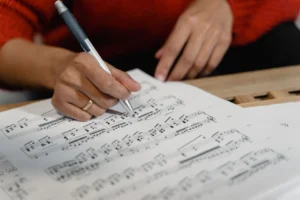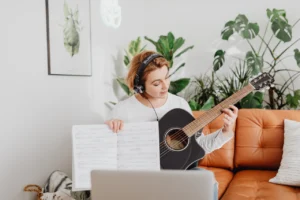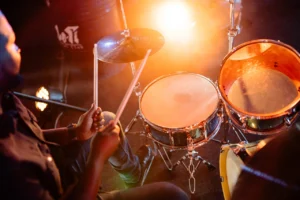Learning guitar can be both exciting and overwhelming, especially when you’re eager to progress quickly on guitar. While it’s essential to practice regularly, it’s just as important to practice smart. In this blog, we’ll share practical tips and strategies to accelerate your guitar learning process without compromising on the quality of your playing. Whether you’re a complete beginner or have some experience, these methods can help you get faster results.
Set Clear Goals for Your Progress
To make rapid progress on the guitar, it’s crucial to set specific, achievable goals. Instead of saying, “I want to get better at guitar,” break your goals down into smaller, more manageable steps. For instance, aim to learn a specific chord progression or master a new technique by the end of the week. By setting clear goals, you’ll have a roadmap for your practice sessions, helping you stay focused and motivated.
Moreover, having short-term objectives will give you a sense of accomplishment and momentum, encouraging you to keep pushing forward. Track your progress and adjust your goals if needed to make sure you’re always moving in the right direction.
Practice with Purpose: Focus on What Matters
One of the most effective ways to speed up your guitar progress is to practice with purpose. Many beginners fall into the trap of playing the same songs or exercises repeatedly without challenging themselves. Instead, focus on the areas where you’re struggling the most—whether it’s mastering a new chord shape, improving finger strength, or refining your picking technique.
Additionally, breaks down complex pieces into smaller sections. This approach allows you to work on difficult parts without feeling overwhelmed. Once you’ve mastered a section, move on to the next, and gradually combine them into the full song or piece.
Develop a Consistent Practice Routine
Consistency is key when it comes to progressing quickly on guitar. Setting aside time every day to practice—even if it’s just for 20 to 30 minutes—can make a huge difference over time. Try to stick to a set practice routine that includes warm-ups, technique exercises, and songs you want to learn.
However, don’t overwhelm yourself with long practice sessions. Short, focused practice periods can be far more effective than long, unfocused ones. By practicing consistently, you’ll build muscle memory and improve your skills faster.

Embrace Slow Practice to Build Precision
It may seem counterintuitive, but practicing slowly is one of the best ways to progress quickly on guitar. When you play a piece or technique slowly, you allow yourself time to focus on every note and movement, ensuring accuracy. Once you’ve mastered it at a slower speed, gradually increase the tempo.
This approach is especially helpful for challenging riffs or solos. By playing slowly at first, you’ll develop a cleaner, more controlled sound, which will serve you better in the long run than rushing through the notes.
Use Technology to Your Advantage
In today’s digital age, there’s a wealth of resources available to help speed up your guitar learning process. You can use apps, metronomes, and online tutorials to aid your practice. For example, guitar tuning apps ensure your guitar is always in tune, while metronomes help you keep time and develop rhythm skills.
Additionally, many guitarists find it helpful to use backing tracks to practice playing along with music. This provides a sense of real-world context, helping you improve your timing and improvisation skills.
Stay Motivated and Challenge Yourself
Learning guitar can be a long journey, and it’s normal to experience plateaus or moments of frustration. The key to staying motivated is to challenge yourself regularly. This could mean learning more difficult songs, experimenting with different genres, or trying new techniques that push you outside your comfort zone.
Celebrate your progress, no matter how small it may seem. This will keep you engaged and excited about your next learning milestone. Remember, consistent effort leads to steady improvement.
Seek Guidance and Feedback
Lastly, one of the quickest ways to progress quickly on guitar is to seek feedback from experienced guitarists or teachers. A teacher can provide personalized tips, help you correct bad habits, and introduce new techniques that you might not discover on your own. Regular lessons or even occasional feedback can make a huge difference in how quickly you learn.
At Oohlala Fine Arts, our guitar instructors are dedicated to helping students of all levels improve their skills. With years of experience, they guide you through the learning process, offering tips and encouragement that keep you on track.
Keep Practicing, Keep Improving
In conclusion, accelerating your guitar progress is all about practicing smart, staying consistent, and challenging yourself in the right ways. By setting clear goals, focusing on weak areas, and practicing regularly, you’ll speed up your learning process without sacrificing quality. Embrace slow practice, use technology to enhance your practice, and seek guidance to make your journey more efficient.
At Oohlala Fine Arts, we’re committed to helping you reach your guitar goals. Whether you’re a beginner or an experienced player, our guitar instructors are here to provide the guidance and support you need to become the guitarist you’ve always dreamed of.




